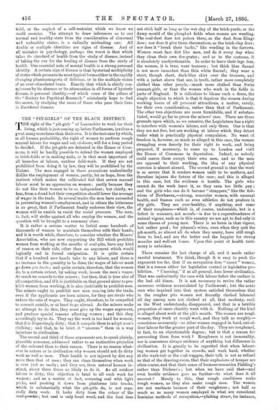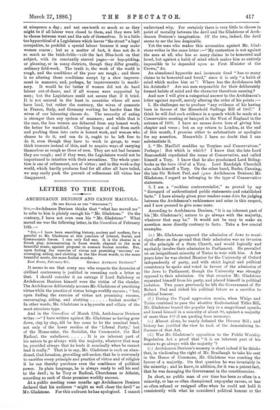THE "PIT-GIRLS" OF THE BLACK DISTRICT.
THE right of the " pit-girls " of Lancashire to work for their living, which is just coming up before Parliament, involves a great many morefates than theirown. It is the test-case by which, in all human probability, the right of women to perform rough manual labour for wages and out-of-doors, will for a long period be decided. If the pit-girls are defeated in the House of Com- mons, it will be hardly possible to defend the women employed in brick-fields or in making nails, or in that most important of all branches of labour, outdoor field-work. If they are not prohibited from doing it by law, they will be prohibited by the Unions. The men engaged in these avocations undoubtedly dislike the employment of women, partly, let us hope, from the instinct which makes the cultivated feel that severe manual labour must be an oppression on women ; partly because they do not like their women to be so independent; but chiefly, we fear, from a dread lest their competition should lower the average of wages in the trade. In several trades the men have succeeded in preventing women's employment, and in others the bitterness is so great, that if Parliament finally endorses their view, the women will be unable to resist the social pressure. The men, in fact, will strike against all who employ the women, and the question will be brought to a summary close.
It is rather a serious matter to forbid some hundreds of thousands of women to maintain themselves with their hands, and it is worth while, therefore, to consider whether the Miners' Association, who are now supporting the Bill which prohibits women from working at the mouths of coal-pits, have any kind of reason on their side, other than an argument which would logically end in forced emigration. It is quite certain that if a hundred new hands take to any labour, and there is no increase in the quantity to be done, the wages of labour must go down pro twit° ; and quite certain, therefore, that the women do, to a certain extent, by asking work, lessen the men's wages. So much we concede to the miners ; but then, that is true also of all competition, and if it is justifiable on that ground alone to pro- hibit women from working, it is also justifiable to prohibit men. The miners ought to prohibit new men coming into the trade, even if the applicants are born miners, for they are rivals who reduce the rate of wages. They ought, therefore, to be compelled to commit suicide, or at least to go abroad. As the miners make no attempt to do this, they must give up the wages argument, and produce special reasons affecting women ; and this they accordingly try to do. They say the work is too bard for women; that it is disgustingly dirty ; that it compels them to adopt men's clothing ; and that, to be brief, it " unsexes " them in a way injurious to civilisation.
The second and third of these arguments are, to speak plainly, plausible nonsense, addressed rather to an instinctive prejudice of the cultured than to their reason. There is no reason what- ever in nature or in civilisation why women should not do dirty work as well as men. Their health is not injured by dirt any more than that of men ; they can clean themselves when work is over just as easily ; and they are, from natural human in- stinct, about three times as likely to do it. As all outdoor labour is dirty, this objection is fatal to all such work for women ; and as a matter of fact, screening coal with light picks, and pushing it down from platforms into trucks, which is substantially what the pit-girls do, is not espe- cially dirty work. It looks dirty from the colour of the coal-powder ; but coal is only fossil wood, and the dust does not stick half so long as the wet clay of the brick-yards, or the damp mould of the ploughed fields when women are weeding. The coal-dust does not poison them, as the dust from filings does ; nor does it give them rheumatism, as the brick-clay does ; nor does it "break their backs," like weeding in the furrows. Women must face dirt like men, and do it every day when they clean their own fire-grates ; and as to the costume, it is absolutely unobjectionable. In order to leave their legs free, the women, it is true, wear trousers ; but thick blue flannel is not more immodest than thin white flannel; they wear a stout, though short, dark-blue skirt over the trousers, and with a jacket above that are, in truth, rather more completely clothed than other people,—much more clothed than Swiss peasant-girls, or than the women who work in the fields in parts of England. It is ridiculous to blame such a dress, the single objection to which is that it deprives the women during working hours of all personal attractions, a matter, surely, for their own consideration, rather than that of Parliament. The other two objections are more formidable, and if substan- tiated, would go far to prove the miners' case. There are three grounds upon which, as we conceive, the Legislature has a right to interfere with women's labour, and only three. One is that they are not free, but are working at labour which they detest under what is practically physical compulsion. No want of freedom is, however, so much as alleged in this case, the women struggling even fiercely for their right to work, and being prepared, if necessary, to come up to London and visit the House of Commons in deputation. Indeed, as nobody could coerce them except their own men, and as the men are opposed to their working, the idea of any physical coercion is almost absurd. The second ground is that the work is so severe that it renders women unfit to be mothers, and therefore injures the future of the race ; and this is alleged in this case, but the evidence is hostile. The girls who cannot do the work leave it, as they earn too little pay ; and the girls who can do it become " strappers," like the fish- wives of Newhaven,—strong, muscular women, with unusual health, and frames such as even athletics do not produce in city girls. They are over-healthy, if anything, and some of their roughness—which is, of course, undeniable, but is a defect in manners, not morals—is due to a superabundance of animal vigour, such as in this country we are apt to find only in some classes of young men. There is no harm in that vigour, but rather good ; for pitmen's wives, even when they quit the pit-mouth, as almost all do when they marry, have still rough lives to lead, and are the better and the happier for strong muscles and well-set bones. Upon this point of health testi- mony is unbroken.
There remains the last charge of all, and it needs rather careful treatment. We think, though it is easy to push the argument too far, that if an occupation does "unsex " women, that is a reason either for legislative control or legislative pro- hibition. " Unsexing," if at all general, does lower civilisation. That was undoubtedly the case with labour below the surface in the bad old times. It is not necessary to revive the rather nauseous evidence accumulated by Parliament ; but the acute men who inquired into that system satisfied themselves that in the rougher pits women not decently clothed laboured all day among men not clothed at all, that modesty, such as the West understands, disappeared, and that in a terrible proportion of cases chastity went with it. Nothing of the kind is alleged about work at the pit's mouth. The women are rough women, they work at rough work, and they talk as roughly— sometimes as coarsely—as other women engaged in hard, out-of- door labour for the greater part of the day. They are roughened, in fact, to an objectionable degree ; but is that a reason for preventing them from work ? Roughness is not immorality, nor is coarseness always evidence of anything but difference in civilisation. It is greatly to be regretted that when labour- ing women get together in crowds, and work hard, whether at the wash-tub or the coal-waggon, their talk is not as refined as that of the drawing-room, that their explosions of temper are often coarse, and that their sense of humour resembles Fielding's rather than Dickens's ; but when we have said that—and even hostile evidence goes no further—to what does it all amount ? Merely to this, that rough conditions make rough women, as they also make rough men. The women are not unchaste because of their roughness ; not half so much so as many women employed in what are considered feminine methods of occupation,—plaiting straw, for instance,
at ninepence a day ; and not one-tenth so much so as they might be if all labour were closed to them, and they were left to choose between want and the sale of themselves. It is a little too hypocritical of a Legislature which leaves "the street" a legal occupation, to prohibit a special labour because it may make women coarse ; but as a matter of fact, it does not do it so much as the brick-fields—vide the last Blue-book on that subject, with its constantly starred pages—or hop-picking, or gleaning, or in many districts, though they differ greatly, ordinary field-work. The truth is, the work of the world is rough, and the conditions of the poor are rough ; and there is no altering those conditions except by a slow improve- ment in manners, and, perhaps, by improvements in machi- nery. It would be far better if women did not do hard labour out•of-doors, and if all women were supported by men ; but the Legislature could not secure that if it tried. It is not secured in the least in countries where all men have land, but rather the contrary, the wives of peasants in France, Italy, and Germany working far harder than the wives of our labouring classes do. The necessity of eating is stronger than any system of manners; and while that is the case, the less women are debarred from any honest work, the better for mankind. Clearing lumps of coal from earth and pushing them into carts is honest work, and women who choose to do it, and can do it, ought to be left free to do it, even though they have to work in gangs, to wear thick trousers instead of thin, and to acquire ways of carrying themselves as rough as those of men. They are not bad because they are rough ; and if they were, the Legislature would not be importuned to interfere with their avocations. The whole ques- tion is one of refinement, not of virtue ; and in this work-a-day world, which hardly produces food for all after all have toiled, we may easily push the pursuit of refinement till virtue has disappeared.



































 Previous page
Previous page